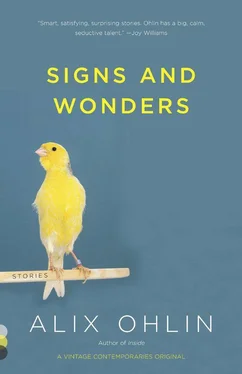Alix Ohlin - Signs and Wonders
Здесь есть возможность читать онлайн «Alix Ohlin - Signs and Wonders» весь текст электронной книги совершенно бесплатно (целиком полную версию без сокращений). В некоторых случаях можно слушать аудио, скачать через торрент в формате fb2 и присутствует краткое содержание. Год выпуска: 2012, ISBN: 2012, Издательство: Random House, Inc., Жанр: Современная проза, на английском языке. Описание произведения, (предисловие) а так же отзывы посетителей доступны на портале библиотеки ЛибКат.
- Название:Signs and Wonders
- Автор:
- Издательство:Random House, Inc.
- Жанр:
- Год:2012
- ISBN:9780307948649
- Рейтинг книги:3 / 5. Голосов: 1
-
Избранное:Добавить в избранное
- Отзывы:
-
Ваша оценка:
- 60
- 1
- 2
- 3
- 4
- 5
Signs and Wonders: краткое содержание, описание и аннотация
Предлагаем к чтению аннотацию, описание, краткое содержание или предисловие (зависит от того, что написал сам автор книги «Signs and Wonders»). Если вы не нашли необходимую информацию о книге — напишите в комментариях, мы постараемся отыскать её.
Signs and Wonders — читать онлайн бесплатно полную книгу (весь текст) целиком
Ниже представлен текст книги, разбитый по страницам. Система сохранения места последней прочитанной страницы, позволяет с удобством читать онлайн бесплатно книгу «Signs and Wonders», без необходимости каждый раз заново искать на чём Вы остановились. Поставьте закладку, и сможете в любой момент перейти на страницу, на которой закончили чтение.
Интервал:
Закладка:
George picked her up wearing a suit and tie.
“It’s like a date,” she said.
“Except it’s not,” he answered, without a smile. That he could never keep from the obvious retort was Reason #463 they were divorced. Nonetheless, he looked good. Since the angioplasty he’d cut out meat and fried food, and his skin had shrunk to a handsome tautness around his cheekbones, like a man stranded on a desert island. She herself had taken up spinning and had lost at least four pounds in the past month, not that George would ever notice or comment (Reason #464). In the car he put on some screeching jazz music, the kind he knew she hated, and Ruth sighed pointedly and looked out the window as they drove into the city: this was a war of gestures both habitual and genuinely annoying. After the divorce they’d each moved into separate town houses in the West Island suburb they’d lived in for years. Superficially this was for the kids, so they could still come home to more or less the same place; secretly, she thought, it was for themselves, so as not to have to find new friends, grocery stores, dentists. Not that the kids seemed grateful anyway. Matthew lived in Calgary with his two children and hardly ever came home, pleading the expense; Jennie lived in Montreal West and visited constantly, complaining to each of them about the wrongs visited upon her in childhood. She had an encyclopedic memory of her own problems. In reparation she extorted from them both money and support for every new undertaking. Thus far, in her thirty-five years, she’d been a photojournalist, yoga instructor, ceramicist, and canine masseuse, each aspiration more unlikely than its predecessor.
Tonight it was light opera. She’d joined a local company and was appearing in their performance of The Mikado, as one of the three little maids from school. When she told her father about the casting, he’d said, “Aren’t you a little old for that part?” and she hung up on him. Then she immediately called to bemoan his insensitivity to Ruth, who agreed, though she had thought the same thing. You just couldn’t say things like that to Jennie. People who never had children thought that parents were responsible for their kids’ personalities. But Jennie had been exactly the same since the day she was born: she had to be pulled from the womb with forceps, hysterical with protest, and her mood hadn’t shifted since. Whereas Matthew, who shared her genes and upbringing, was so remote and placid, so totally imperturbable, that Ruth at times wondered if he was paying attention to anything at all.
George and Ruth had to attend all of Jennie’s events, or there’d be hell to pay in the form of recriminating phone calls and gifted self-help books about truly loving families. When George first remarried, his second wife, Marlena, used to come as well, but she and Jennie didn’t get along and she soon begged off. Ruth envied her. Now it was just the two of them, and after a while they’d started carpooling, because why not? They’d been divorced for fifteen years; they still hated each other, but at this point they were resigned to it.
When they arrived — the auditorium was in a high school, and she had a sudden flashback to seeing the kids, as teenagers, in The Pajama Game and Guys and Dolls —Jennie was standing in the freezing-cold parking lot, smoking a cigarette and watching for them anxiously. She was wearing her stage makeup, white powder and thick eyeliner meant to make her look Japanese. A black wig was perched on her dirty blond hair like an ugly hat. Her arms were crossed and her shoulders slouched inside an enormous blue parka, beneath which peeked a red kimono. When she saw them she looked at once vexed, relieved, and somehow starved. Had she honestly doubted they were coming? Where had she gotten this eternal hunger for their attention? It was a hole they could never fill, year after year though they tried.
“I thought you might not make it,” Jennie said.
“ I thought you didn’t smoke anymore,” George said severely.
“I don’t, really. This is just nerves.”
“You look great, honey,” Ruth said. “Can’t wait to see you up there.”
Jennie grimaced. “Well, it might suck, to be honest with you,” she said. She always had enough distance from her various endeavors to know they weren’t worthy of her time — just not enough to avoid getting involved in the first place. She took a final drag, dropped the cigarette, and poked a sandaled foot from beneath her kimono to crush it out.
“Break a leg, kiddo,” George said.
“I probably will, in this getup,” she said, then gave a little wave and tottered back into the building, taking tiny steps across the snow-covered ground.
Inside, people were filing slowly down the aisles, and Ruth wondered if any of them were here for the joy of Gilbert and Sullivan as opposed to supporting their children or spouses or cousins. It was hard to tell from their expressions whether or not they actually expected to be entertained. She and George took seats toward the back. A small orchestra was warming up by the stage, the instruments rising in a jumble of trills and squawks. In the row in front of them a young child sat weeping silently, holding a melted chocolate bar, the chocolate smeared all over his face. His mother took a Kleenex from her bag and wiped his face roughly, without asking why he was crying.
As she looked at the program, George grimaced and started rubbing his arm.
“What’s wrong?”
“Racquetball injury,” he said. “I’m still playing with Kenny twice a week.”
Ruth sighed and returned to the program, realizing she should’ve known better than to ask. He’d probably only rubbed his arm so he could then brag about racquetball, as if she cared. He’d always been proudest of things she considered trivial (Reason #465). Someone flicked the lights off, then on again, twice. A baby squealed, a resigned hush fell over the audience, and music began to play. Nanki-Poo was looking for Yum-Yum, his true love, but Yum-Yum was already taken, engaged to Ko-Ko. The situation looked bad for Nanki-Poo. The company was having some trouble hitting the high notes, the man playing Pish-Tush had a stutter that repeatedly made him lag behind the music, and the conductor sweated heavily as he fought to bring the musicians and singers into line. The actors’ makeup shone under the bright lights. Her memory stretched farther back to when her children were little, dressed up for Christmas pageants and spring festivals, their cherubic cuteness making every missed line and off-key note all the more endearing.
“This is the worst thing I’ve ever seen,” she muttered. George shushed her, but also nodded.
Jennie and another woman joined Yum-Yum onstage and began to sing. Glancing down at her program in the dark, Ruth tried to remember whether Jennie was Pitti-Sing or Peep-Bo.
“Three little maids who all unwary come from a ladies’ seminary!” they sang, each a quarter-tone off from the others. They were filled to the brim with girlish glee, they informed the audience, fake smiles splitting their faces. Not a one was under thirty, Ruth thought, and they all looked burdened with concentration, arching their necks as they strained for the high notes. Jennie gestured wildly with her hands and sang louder, though no better, than the other two. Finally the song ended, and her parents, loudly, clapped.
At intermission they split up to visit the restrooms, and by the time she came out George had returned to his seat. She would’ve liked to people-watch in the lobby, maybe buy a cookie from the bake-sale table, but didn’t want to stand there alone, so she went back in. The unhappy child in front of them had disappeared, though another baby farther down was crying full throttle. When she pushed past George, he ignored her. The lights were blinking on and off again.
Читать дальшеИнтервал:
Закладка:
Похожие книги на «Signs and Wonders»
Представляем Вашему вниманию похожие книги на «Signs and Wonders» списком для выбора. Мы отобрали схожую по названию и смыслу литературу в надежде предоставить читателям больше вариантов отыскать новые, интересные, ещё непрочитанные произведения.
Обсуждение, отзывы о книге «Signs and Wonders» и просто собственные мнения читателей. Оставьте ваши комментарии, напишите, что Вы думаете о произведении, его смысле или главных героях. Укажите что конкретно понравилось, а что нет, и почему Вы так считаете.












